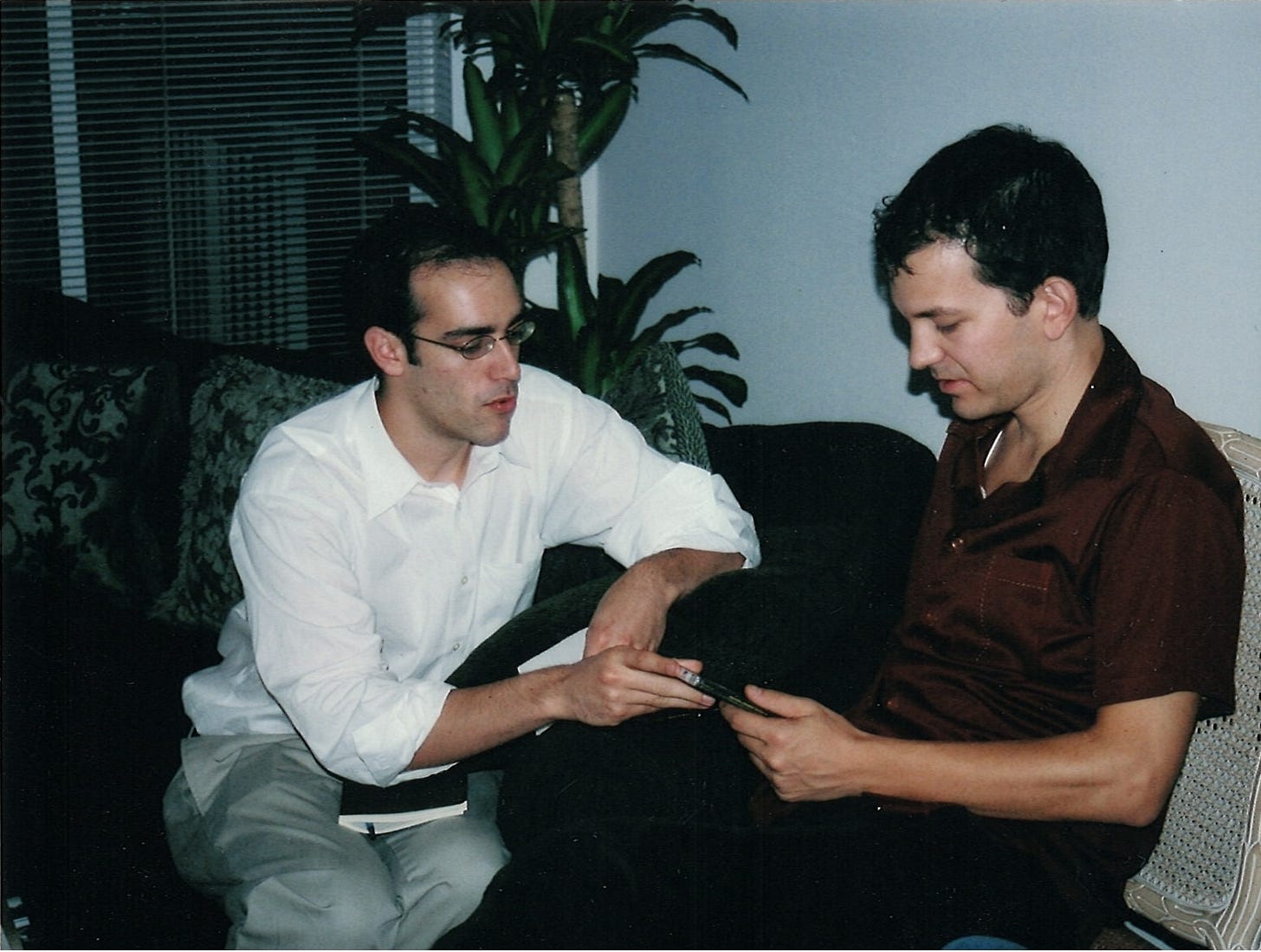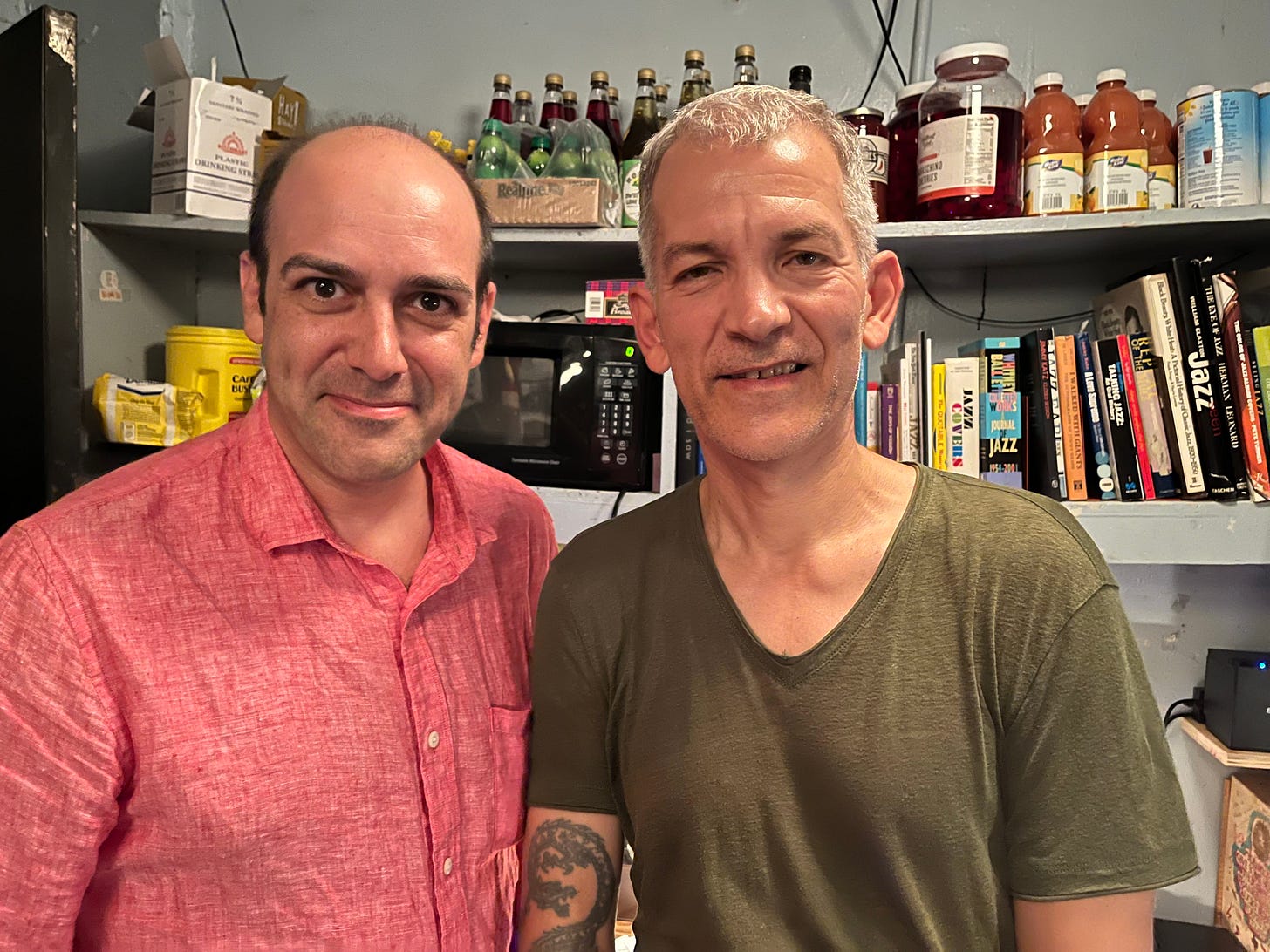And you may find yourself in a beautiful house, with a beautiful wife /
And you may ask yourself, "Well, how did I get here?"
The house and wife were luck and pluck, but why I’m writing for a year about deep music deserves an origin story. It’s one where I open a door to a long hallway and spy another door faintly in the distance.
I was a high school sophomore when my father and I went to see the electro-funk-jazz-bluegrass banjo trio, Béla Fleck and the Flecktones. It was my fourth concert, but neither Johnny Mathis, Genesis, nor Art Garfunkel had left much of a mark.
Just before intermission, the band’s bassist Victor Wooten took an extended solo that wound its way into “Amazing Grace.” Victor hammered, tapped, slapped and shimmied down the stage stairs into the theater aisle, and stopped to groove right in front of me. I was dumbfounded, in awe. Music could be this? It was another order altogether from Phil Collins cavemanning to “I Can’t Dance” at Giants Stadium.1
Victor’s music was personal and virtuosic, beautiful and weird, expressed for the sake of the performer and for all of us listening to him. Did he sense something emanating from me at that moment, causing him to pause and let me experience his musicianship up close?:
I felt irrevocably altered, a first encounter with the transcendent and inexplicable. These were new feelings, ones I sensed I could never name. After the show, my dad dropped me off at my friend Jeff’s house for a long-anticipated party we had preemptively billed as “Jeffapalooza.” The ball of beer at once seemed beside the point.
That evening calcified a nascent feeling that I wasn’t getting all I needed from the rock & roll I’d already committed to memory. And despite my flannel shirts in the fall of ‘94, I wasn’t really connecting to Pearl Jam either. The Flecktones made me feel like I wasn’t a man out of time.
I hungered to hear everything that could make me feel that way again, and I set myself on a lifelong quest. One day, I took a flyer on this album, and the most perfect little ditty got lodged in my brain:
And now you’re reading A Year of Bach.
A few years after the Flecktones show, I was living in Manhattan, trading stocks by day and loosening the ropes of my internal tension by suffusing my life with music. There were concerts in grand halls and sticky-floored dumps, treasure hunts through used CD bins, and endless hours of fingerpicking in my apartment.
Great music allowed me to tell the story of my life to myself, granting me access to ideas and feelings I couldn’t articulate and never understood. During those rare shows when everything hit just right, live concerts would trigger in me involuntary memories— moments touched by joy and sorrow, self-recrimination and triumph.
Around that time, Brad Mehldau released his trio album of original compositions, “House on Hill.” I played it over and over, it became almost a soundtrack to the first year of my marriage. It opens with a jangly, quavering motif that serves as the record’s central nervous system —the theme of “August Ending”:
The wordless song was somehow about my lived experience: a swirl of beauty, discomfort, and the uncanny — always in motion and hinting at the numinous.
Like his heroes Schumann and Brahms, Mehldau’s greatest music names the welled-up emotions that exist beyond language and allows them to burst forth. Expressing big feelings in public is a risky and vulnerable act, but it reaches toward the pinnacle of musical experience: when emotions are sublimated through sound and transcend into the hearts and minds of others.
It’s a kind of magic. How is it possible that I can be made to feel sadness, longing, nostalgia, serenity, or confusion through a wordless medium, conjured by someone whose experiences that shaped their emotional life are necessarily foreign from my own?
Twenty years tick by and it’s May 2024. I sat on the banquette at the Village Vanguard, awaiting Mehldau’s new trio with bassist Vicente Archer and drummer Marcus Gilmore. I’d first seen Brad there just after that first transcendent moment with Victor Wooten, when my life was all possibility.
Brad counted off the first tune and a wave of emotion ran over me — an old friend revisiting with gray in his beard, bringing promises of both familiarity and a new world altogether:
In a moment, I felt the great weight and power of eclipsed time, twenty years of my life condensed, way beyond nostalgia, the big bang in reverse.
My mind opened, and memories reified. I was a teen at a local concert hall with his dad, a lovelorn and anxious undergrad, and a newlywed young professional. A son who buried and mourned his mother. I was a sleep-deprived father, twice over, whose waking life has slowly reoriented towards a series of smaller screens. A trader who quit his career before it killed him, and a semi-grizzled patriot increasingly uneasy in his country, contingency plans in hand for doomsday.
It was as if the tune itself unfolded these thoughts and memories, and I was just there to experience them.
Meditation and therapy and religion have been useful for me, but deep listening has been my most reliable channel to self-conceptualize as a being beyond language, moving through time.
Then there’s the brutal evidence. It doesn’t really feel like twenty years:
“August Ending,” is a song about the paradoxical twin losses of independence and family togetherness, mixed with nerves for the school-year to come. It concludes by calling back to its beginning.
Just like life itself… And you may find yourself thrown into a world, grasping, until structure allows for comprehension. You settle in, lucky to play the game, if only once, comforted by people whose art clears pathways into yourself and into new worlds. And then you find yourself at the door at the far end of the hallway: the ending, left forever unresolved.
I won two tickets to see Genesis in 1992 at Giants Stadium by being the 95th caller to a contest on 95.5 WPLJ-FM. I was 13 and went with my mother. The chemically impaired taxi driver taking us home reversed on a highway after she unwittingly drove towards the mouth of the Lincoln Tunnel, nearly killing us. The whole thing, including Phil Collins’ dance linked hereto, was and remains very embarrassing.








I enjoy the way that you write about music. My own hallway is sickeningly long, reaching all the way back to…David Cassidy. I was only 4, but I had a very indulgent mother.
Thanks for sharing your personal journey. Thinking a lot about my own hallway now...